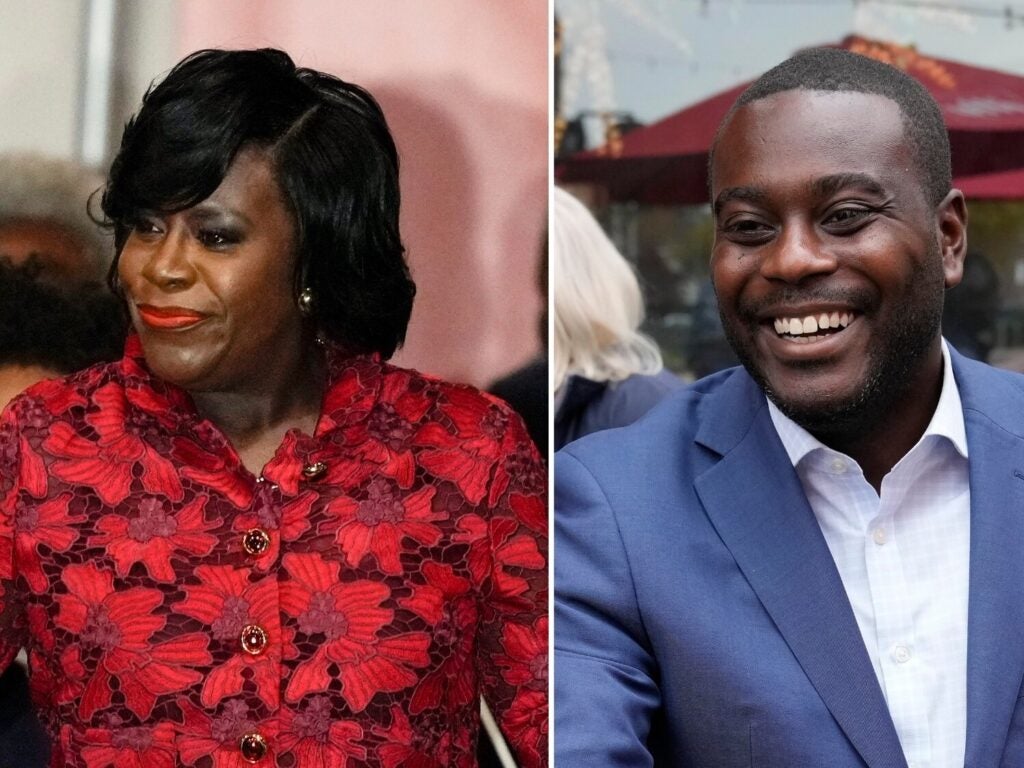Democrats — and abortion rights — dominated the 2023 elections. Here are 5 takeaways

Supporters for a pro-abortion ballot measure cheer as they watch election results come in on Tuesday in Columbus, Ohio. (Sue Ogrocki/AP)
Tuesday’s elections brought victories to Democrats and supporters of abortion rights across multiple states — including in some that voted for former President Donald Trump in 2020.
Democrats won key legislative and gubernatorial races in Virginia and Kentucky. Democratic candidates in both those states campaigned on abortion access.
“I think it speaks to [abortion rights] as an issue, that this isn’t just a Republican or a Democratic issue,” said Jessica Taylor of the Cook Political Report. “You have Republicans that are clearly voting for it, because Ohio is a state that Trump won by 8 points twice.”
Democrats around the country are already focused on the 2024 presidential race and looking to Tuesday’s elections as a possible litmus test on the national mood.
But Taylor cautions against viewing these results as 2024 tea leaves.
Still, many national Democrats were quick to celebrate Tuesday’s victories.
“Tonight, Americans once again voted to protect their fundamental freedoms — and democracy won,” President Biden wrote on X, the platform formerly known as Twitter.
Here’s what else to know:
Ohio voted to protect abortion rights in its constitution
Ohioans voted to amend their state constitution to guarantee the right to abortion and other reproductive rights.
Ohio was the only state voting directly on abortion access this election cycle. The campaigns both for and against the proposed amendment dominated local airwaves and captured national attention.
More than 56% of voters supported the amendment. Various polls consistently show somewhere between 55% and 58% of Ohioans support at least some abortion rights, the Statehouse News Bureau reports.
The state’s Republican governor and GOP-led Congress opposed the amendment, and had tried unsuccessfully to change the state constitution to require a 60% threshold to pass constitutional amendments, as opposed to a simple majority.
The passage of this amendment effectively ends a state law that prohibits abortion once fetal cardiac activity can be detected — as early as six weeks into pregnancy — with no exceptions for rape or incest. It took effect for several months in 2022 but has been on hold as legal challenges worked their way up to the state Supreme Court.
Virginia Democrats regained control of the state legislature

All 140 legislative seats in Virginia were up for grabs this year. Democrats not only maintained control of the state Senate but also won enough seats to flip the House, giving them more power to push back on Republican Gov. Glenn Youngkin and his agenda.
Don Scott, the minority leader of House Democrats — and favored to become the new House speaker — told NPR Democratic candidates had “the message, the candidates, and the momentum to put a stop to the extreme Republicans’ agenda.”
Abortion access played a big role in many of these campaigns, VPM reports. Virginia has become a sort of southern refuge for abortion rights since the U.S. Supreme Court overturned Roe v. Wade last year.
Youngkin led Virginia Republican candidates in pushing for a ban on abortions starting at 15 weeks, with exceptions for rape, incest, and to save the life of the mother. He refrained from using the word ‘ban’, characterizing it instead as a “limit.”
Taylor, of the Cook Political Report, said this was “really a test of whether Republicans could sort of message this differently.”
While abortion rights were no doubt a motivating factor for many Virginia voters, it’s worth noting that there were many other campaign issues at play as well, including crime and the economy.
Kentucky reelected its Democratic governor

(Stephen Cohen/Getty Images)
Democratic Gov. Andy Beshear won a second term in Kentucky, beating out Trump-endorsed Republican state Attorney General Daniel Cameron.
Beshear’s popularity has remained high in a deeply red state, with voters praising him for his leadership during the COVID pandemic, deadly tornadoes, record flooding, and ice storms, Kentucky Public Radio reports.
Incumbent governors rarely lose, Taylor said — but it wasn’t just Beshear’s popularity that worked in his favor. She said he was able to “go on offense” on abortion because of the state’s stringent law, which doesn’t allow exceptions for rape and incest.
There are signs that legislation is out of touch with Kentucky voters, who last year rejected an amendment that would have added language to the state constitution making it harder to challenge abortion restrictions.
Beshear campaigned in part on increasing abortion access, including by running an emotional campaign ad featuring a young woman who was raped by her stepfather at the age of 12.
Democrats celebrated Beshear’s win as bad news for Republicans in 2024. Kentucky Public Radio notes the winning parties of Kentucky’s last six gubernatorial elections have matched those of the following year’s presidential election winners.
Mississippi reelected its Republican governor

Meanwhile, Republican Gov. Tate Reeves won reelection in Mississippi — which no Democrat has governed in 20 years.
He defeated Brandon Pressley, a Democrat and one of the state’s three public service commissioners (not to mention a second cousin of the rock and roll legend Elvis). Pressley campaigned in part on expanding Medicaid in the state, which Reeves has refused to do.
Reeves’ popularity and fundraising prowess gave him a significant and expected advantage, but the race became more competitive than many had expected, as Mississippi Public Broadcasting reported.
Pressley campaigned in all 82 counties and focused especially on engaging Black voters (which Reeve’s Democratic opponent in 2019 had been criticized for not doing).
Taylor said the Mississippi race underscores how hard it is to beat incumbent governors.
“I think just the state’s dynamics won out in that regard,” she said.
Historic wins in Rhode Island and Pennsylvania

(Matt Rourke/AP; Steven Senne/AP)
Tuesday night also saw historic victories for several Black Democratic candidates.
Philadelphia elected Cherelle Parker as its 100th mayor. She is the first woman and first Black woman to hold the title.
The 51-year-old has served as a state representative on the Philadelphia City Council (including as the majority leader) and most recently as the chair of the Delaware River Port Authority.
WHYY reports Parker’s victory was expected after she won her party’s primary in May, with a tough-on-crime agenda and the support of labor and the city’s Democratic establishment.
She has promised to hire 300 new police officers, aggressively target low-level crimes, and bring in the National Guard as part of her response to the opioid crisis. She has also floated “year-round” schooling and gradually reducing city wage taxes, among other proposals.
Parker, who has spoken of being born to a single teenage mother and raised by her grandparents on welfare and food subsidies, told her supporters she would use her personal, academic, and professional experience to “make Philadelphia the safest, the greenest big city in the nation with economic opportunity for all.”
Farther north, Gabe Amo won the special election for Rhode Island’s 1st Congressional District seat, becoming the first Black person to represent the state in Congress.
Amo is serving the rest of the term of former Democratic Rep. David Cicilline, who stepped down over the summer to become the president of the Rhode Island Foundation. Amo will be up for reelection again in 2024.
The 35-year-old son of Ghanaian and Liberian immigrants most recently served as the deputy director of the White House Office of Intergovernmental Affairs, working as Biden’s principal liaison to mayors and local elected officials.
Among other issues, Amo has pledged to work to legalize abortion rights nationwide, fight for federal legislation to combat climate change, and promote stronger gun control legislation, the Associated Press reported.
Amo said he would fight against what he described as extremist Republican attempts to slash funding for Social Security and Medicare.
“Undoubtedly, I’m humbled by the real momentous opportunity to serve as the first person of color,” Amo told the AP. “But I didn’t run to make history.”




